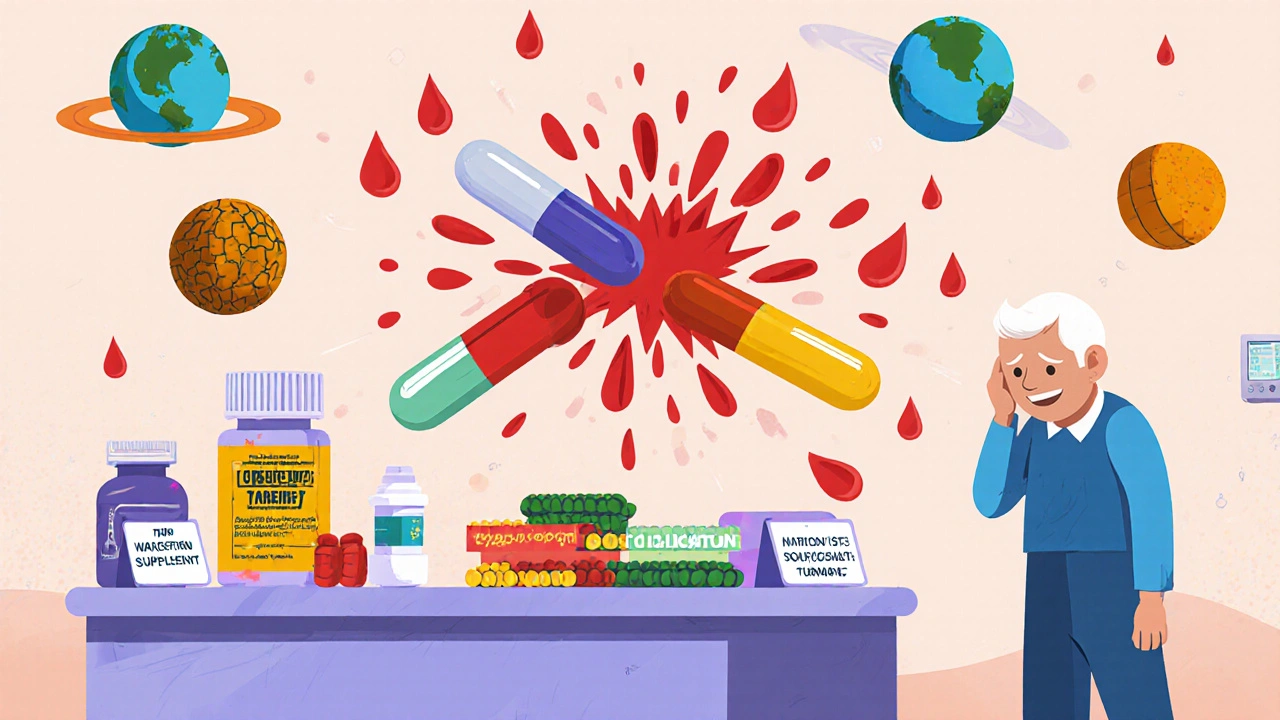
Every year, tens of thousands of people in the U.S. end up in the hospital-or worse-because of something as simple as taking two pills together. It’s not always the drugs themselves that are dangerous. It’s what happens when they mix. And when it comes to heart medications, the stakes couldn’t be higher.
Why Heart Medications Are Especially Risky
Heart medications work in precise, delicate ways. They control blood pressure, regulate heart rhythm, thin the blood, or help the heart pump more efficiently. But when two or more of these drugs are taken together, their effects can clash. One drug might slow down how fast another is broken down. Another might make your kidneys hold onto too much potassium. The result? A sudden drop in blood pressure, dangerous bleeding, or even a heart attack-even if you’ve never had one before.According to a 2023 study from the USC Schaeffer Center, people over 65 who took just two medications with cardiovascular side effects had more than double the risk of heart attack, stroke, or death compared to those taking only one. Triple combinations? Risk jumped by 218%. And here’s the kicker: nearly half of older adults in the U.S. take five or more prescription drugs every week. Many don’t even realize they’re at risk.
The 7 Most Dangerous Combinations to Avoid
Not all drug interactions are created equal. Some are rare. Others are common-and deadly. Here are the seven combinations you need to know about, based on clinical data and real-world outcomes.- Warfarin and ibuprofen: Warfarin thins your blood. Ibuprofen irritates your stomach lining. Together, they increase your risk of serious gastrointestinal bleeding by 300%. This isn’t just a theoretical risk. In Drugs.com reviews, people reported bleeding after dental work, nosebleeds that wouldn’t stop, and emergency hospital visits-all from taking Advil with their blood thinner.
- Warfarin and acetaminophen: You might think Tylenol is safe. But when taken regularly with warfarin, it can raise your INR (a measure of blood clotting) by 2 to 3 points. That’s enough to push you into dangerous bleeding territory. One 2021 study found that chronic use of this combo increased the risk of major bleeding by 40%.
- PDE-5 inhibitors (like Viagra) and nitrates (like nitroglycerin): This is a medical emergency waiting to happen. PDE-5 inhibitors relax blood vessels. Nitrates do the same. Together, they can crash your systolic blood pressure below 70 mmHg. People have died from this combination, even when taken hours apart. If you’re on any form of nitrate for chest pain, never take erectile dysfunction drugs without talking to your doctor.
- Statins and amiodarone: Statins lower cholesterol. Amiodarone treats irregular heartbeats. But when taken together, the risk of muscle damage (myopathy) skyrockets by 400-500%. Symptoms? Severe muscle pain, weakness, dark urine. Left unchecked, this can lead to kidney failure.
- ACE inhibitors and potassium supplements: ACE inhibitors help your heart by relaxing blood vessels. But they also make your body hold onto potassium. Add a potassium supplement or salt substitute, and your levels can spike past 5.5 mEq/L. That’s dangerously high. A 2021 JACC study found that 18.7% of patients on this combo developed life-threatening hyperkalemia. Normal levels are 3.5-5.0.
- Digoxin and verapamil: Digoxin strengthens heart contractions. Verapamil slows your heart rate. Together, verapamil blocks how your body clears digoxin. Serum levels can rise by 60-75%. That leads to nausea, confusion, vision changes, and irregular heart rhythms. In one case, a 72-year-old man ended up in the ICU after his doctor added verapamil without adjusting his digoxin dose.
- NSAIDs and blood pressure meds: Ibuprofen, naproxen, diclofenac-these are everywhere. But they make your body hold onto fluid, raise blood pressure, and reduce the effectiveness of diuretics by 25-30%. A 2023 review found that NSAID use increases heart failure risk by 15-20%. One Reddit user shared how taking ibuprofen for back pain led to acute kidney injury and hospitalization while on lisinopril.
What About Supplements? They’re Not Always Safe
Many people think natural means safe. That’s not true when it comes to heart meds.St. John’s wort, for example, speeds up how your liver breaks down warfarin, making it less effective. That means clots can form. On the flip side, turmeric and garlic can thin your blood, adding to the risk if you’re already on anticoagulants. Omega-3 supplements? High doses can also increase bleeding risk. A 2021 NEJM article pointed out that most patients don’t tell their doctors about supplements-until something goes wrong.
Even something as simple as a multivitamin with potassium can be risky if you’re on an ACE inhibitor or ARB. Always list every pill, powder, or drop you take-no matter how small it seems.
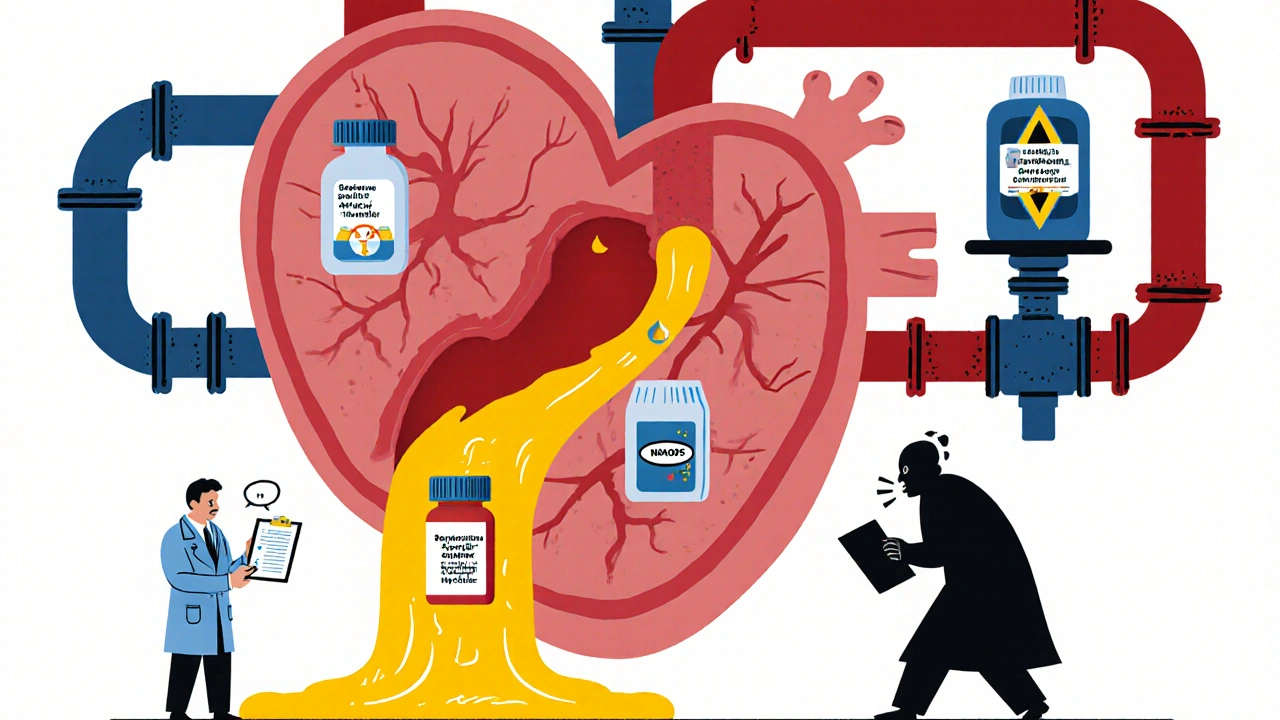
Why Doctors Miss These Interactions
You’d think your doctor would catch this. But the system isn’t built for it.A 2023 AHRQ report found that only 37% of primary care doctors routinely screen for dangerous drug combinations during medication reviews. Why? Time. Many appointments are 10-15 minutes long. Patients often bring up new meds one at a time. Over-the-counter drugs, supplements, and herbal remedies rarely get mentioned unless asked directly.
And electronic systems? They help-but they’re not perfect. Clinical decision support tools flag dangerous combos with 85-92% accuracy, but only if the full list of medications is entered. If you forget to mention that you’re taking ibuprofen for your knees, the system won’t know.
What You Can Do to Stay Safe
You don’t have to wait for your doctor to catch a mistake. Here’s what works:- Keep a real-time medication list. Write down every pill, including dosages: “Lisinopril 10 mg once daily,” not “blood pressure pill.” Include over-the-counter meds, supplements, and even vitamins. Update it every 30 days.
- Use one pharmacy. Pharmacists are trained to spot interactions. When all your prescriptions come from the same place, they can flag problems before you even leave the counter. Medicare Part D covers free medication therapy management (MTM) sessions-20-30 minutes with a pharmacist to review everything you take.
- Ask these three questions at every appointment:
- “Is this new medication safe with everything else I’m taking?”
- “Could this interact with any over-the-counter drugs or supplements?”
- “What should I watch for if something goes wrong?”
- Don’t assume OTC is safe. If it’s not on your list, don’t take it. Even a single dose of ibuprofen can be risky if you’re on warfarin or a diuretic.
- Bring your list to every visit. Even if you’ve been seeing the same doctor for years. Medications change. So should your list.
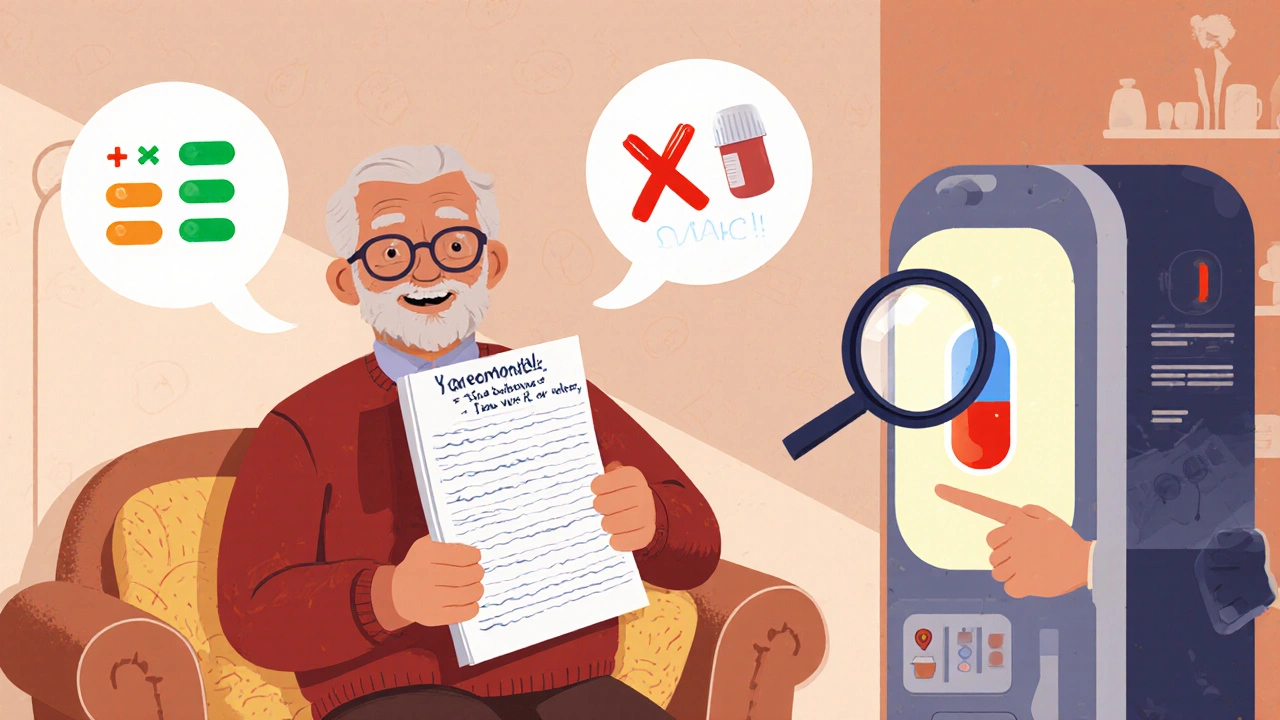
What’s Changing for the Better
There’s hope. The system is slowly improving.Since 2022, Medicare Part D has required all plans to offer medication reviews with pharmacists. The FDA now requires black box warnings on 27 cardiovascular drugs-including NSAIDs-when used with anticoagulants. In 2024, AstraZeneca launched a new fixed-dose pill combining dapagliflozin, sacubitril, and valsartan. It reduces the number of pills a heart failure patient takes, lowering the chance of bad interactions.
Researchers at Northwestern are testing “polypills”-single pills that combine proven heart medications. Early results show 22% better adherence and 15% fewer side effects. And AI-powered tools are coming. Within five years, they could cut dangerous combinations by 40-50% by scanning your full medication history in seconds.
It’s Not All Bad News
Some combinations actually save lives. Statins, aspirin, and beta blockers together have been shown to improve survival by 25-30% in high-risk patients. SGLT2 inhibitors like dapagliflozin, when added to standard heart failure treatment, reduce hospitalizations and death by 14%.The point isn’t to avoid all combinations. It’s to know which ones are safe-and which ones can kill you. The difference? Awareness. Communication. And never assuming a pill is harmless just because it’s available without a prescription.
Can I take ibuprofen if I’m on a blood thinner?
No, not without your doctor’s approval. Ibuprofen and other NSAIDs increase the risk of serious bleeding by 300% when taken with warfarin or other anticoagulants. Even occasional use can trigger a gastrointestinal bleed. Use acetaminophen (Tylenol) instead for pain relief, but only if your liver is healthy. Always check with your doctor before taking any NSAID.
Is it safe to take potassium supplements with lisinopril?
No. Lisinopril is an ACE inhibitor that causes your body to retain potassium. Adding a potassium supplement or salt substitute can push your levels above 5.5 mEq/L, leading to dangerous heart rhythms or cardiac arrest. A 2021 study found that 18.7% of patients on this combo developed life-threatening hyperkalemia. Your doctor should check your potassium levels regularly if you’re on ACE inhibitors.
Can St. John’s wort interfere with my heart meds?
Yes. St. John’s wort speeds up how your liver breaks down warfarin, making it less effective and increasing your risk of stroke or blood clots. It can also reduce the effectiveness of beta blockers and some statins. Even if you think it’s just a “natural remedy,” it’s a powerful drug interaction. Always tell your doctor if you’re taking it.
Do I need to tell my pharmacist about supplements?
Yes. Pharmacists are your best defense against dangerous combinations. They see all your prescriptions and can spot interactions your doctor might miss. Medicare Part D covers free medication reviews with pharmacists-use it. Bring a list of every supplement, herb, or vitamin you take, even if you think it’s harmless.
What should I do if I accidentally took a dangerous combination?
Call your doctor or pharmacist immediately. If you’re having symptoms like dizziness, chest pain, unusual bleeding, confusion, or irregular heartbeat, go to the emergency room. Don’t wait. Some interactions, like PDE-5 inhibitors with nitrates, can cause life-threatening drops in blood pressure within minutes. Keep your medication list handy so you can tell them exactly what you took.
Are there heart meds that are safe to take together?
Yes. Some combinations are proven to save lives. For example, statins, aspirin, and beta blockers together reduce death risk by 25-30% in high-risk patients. SGLT2 inhibitors like dapagliflozin, when added to standard heart failure treatment, lower hospitalizations and death by 14%. The key is knowing which ones are safe and why. Always ask your doctor if a new combination is beneficial or risky.
Final Thought: Your Life Depends on This
Heart medications are powerful. They can keep you alive. But they can also kill you-if you don’t know what you’re mixing them with. The problem isn’t just doctors or pharmacies. It’s the quiet assumption that because a pill is sold over the counter, it’s harmless. That’s how people end up in the hospital.Take control. Keep a list. Talk to your pharmacist. Ask questions. Don’t let a simple mistake cost you your life.
11 Comments
caroline howard
October 29 2025
oh wow, so that’s why my uncle ended up in the ER last year? He was popping Advil like candy and on warfarin. Classic case of ‘natural’ doesn’t mean ‘safe.’
Also, side note: if you’re gonna take supplements, at least tell someone who’s got a medical degree. Not your cousin who reads ‘health blogs’ on Reddit.
Melissa Thompson
October 31 2025
How dare you suggest that over-the-counter medications are harmless?! This is why America’s healthcare system is collapsing-because people think Tylenol is ‘just a pill’ and don’t realize that pharmacokinetics are not a suggestion, they are a LAW. The FDA has black box warnings for a reason! And yet, here we are-2024-and people still don’t know what INR means. Pathetic.
Rika Nokashi
November 2 2025
As someone from India where polypharmacy is rampant due to unregulated pharmacy practices, I can tell you this problem is global. In Mumbai, people buy warfarin and ibuprofen together from the same shop without a prescription-no doctor, no counseling, no warning labels. The result? Emergency wards filled with elderly patients bleeding internally. And yet, no one takes responsibility. It’s not just about knowledge-it’s about culture. We treat pills like candy because we’ve lost respect for the science behind them.
Joe Puleo
November 3 2025
Biggest tip I ever got? Keep a little notebook in your wallet. Write down every pill you take-brand, dose, why you take it. Show it to your pharmacist every time you pick up a new script. They’ll thank you. Seriously.
And yeah, St. John’s wort? It’s not herbal tea. It’s a drug. Treat it like one.
Austin Levine
November 4 2025
So what’s the deal with omega-3s? I take 2000mg daily for inflammation. Is that risky too?
Joe Puleo
November 6 2025
At 2000mg? Probably fine if you’re not on heavy anticoagulants-but check with your doc. High-dose fish oil can thin blood a bit. Not as bad as NSAIDs, but still, better safe than sorry.
Andrea Swick
November 7 2025
I love that they mentioned the polypills. My grandma’s on four different heart meds. She forgets half of them. If they could just combine them into one pill, she’d actually take it. Why isn’t this standard yet?
Ben Jackson
November 9 2025
Pharmacists are the unsung heroes of this whole system. I used to think they just handed out pills. Now I know they’re the ones catching the deadly combos before you even walk out the door. If your pharmacy doesn’t offer MTM-ask for it. It’s free under Medicare.
Keith Bloom
November 10 2025
lol so i’ve been taking lisinopril and potassium supplements for 3 years… guess i’m gonna die soon? jk. but seriously, my dr never mentioned this. how many other things am i doing wrong?
Don Moore
November 11 2025
Thank you for this comprehensive and vital summary. The data presented is not only accurate but critically necessary for public health literacy. I urge all readers to implement the five safety measures outlined. The burden of preventing adverse drug events should not rest solely on clinicians-it must be shared by every patient who takes medication. Your life depends on awareness, not assumption.

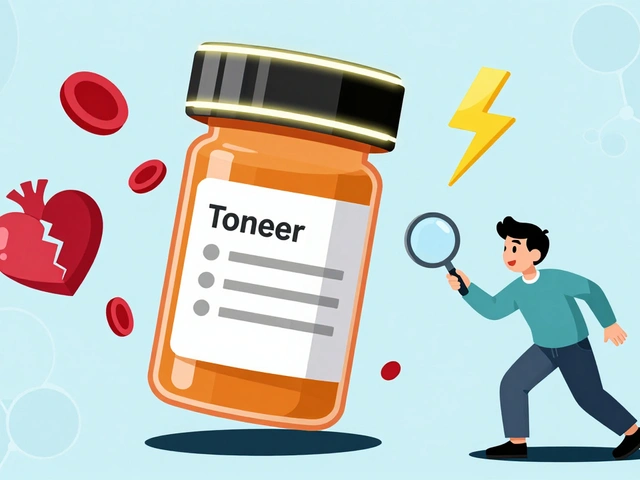
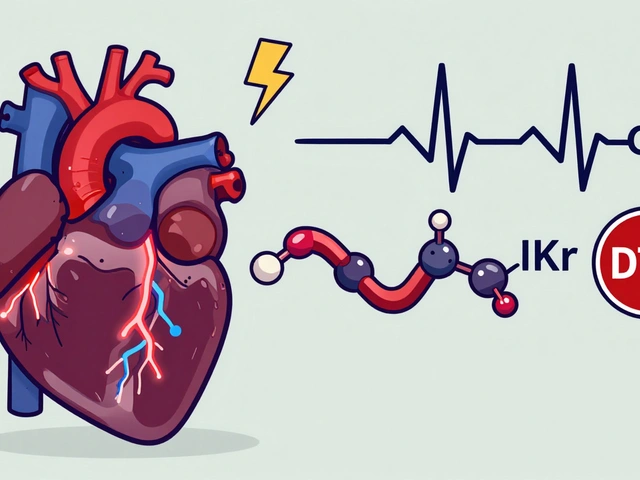

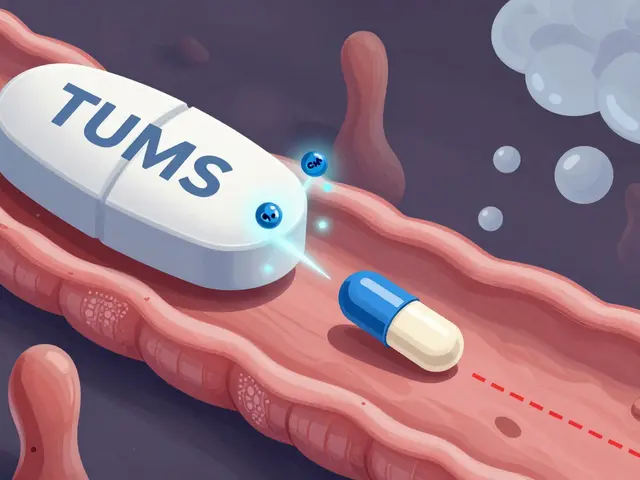
Matthew King
October 29 2025
man i just took ibuprofen for my back and didn’t think twice… guess i’m calling my pharmacist tomorrow. thanks for the wake-up call.